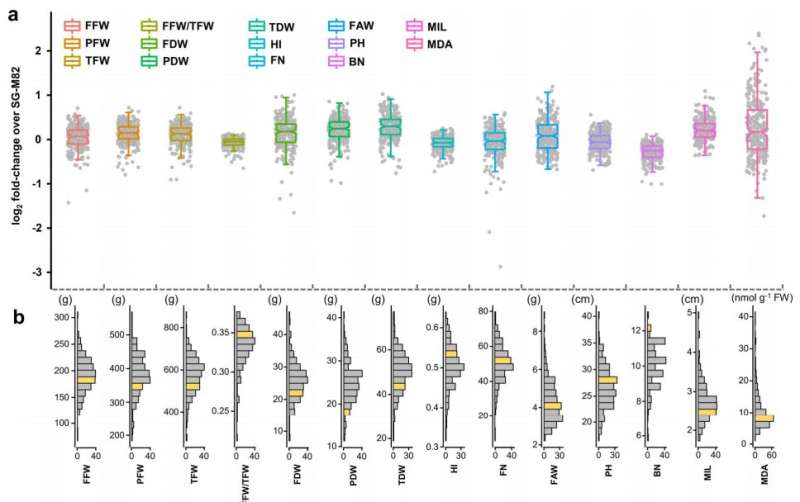Variation of morphological traits and malondialdehyde (MDA) content across the grafted tomato population. Credit: Nanjing Agricultural University The Academy of Science
Grafting in tomato has been investigated mainly in small-scale experiments, demonstrating morphological, physiological, and metabolic changes in the scion mediated by the rootstock. By grafting a scion onto different rootstocks, scion salt tolerance can be altered and improved, leading to enhanced plant growth, fruit yield, and fruit quality. Increased salt tolerance, manifested as improved growth or physiological performance of the grafted tomatoes, is due to interactions between the scion and rootstock. However, no comprehensive investigation has been performed to determine how the metabolic response of plant leaves under sub-optimal conditions is mediated by rootstock biodiversity or how rootstock-mediated leaf metabolism is associated with plant yield traits.
Recently, scientists from the Albert Katz International School for Desert Studies reported the effects of 254 tomato rootstock accessions on the morphological and metabolic traits of cultivated M82 scions under saline soil conditions. They demonstrated phenotypic diversity in the scion and metabolic perturbations in the leaves, which were both modulated by the different rootstocks in response to salinity. They found a highly responsive trait (malondialdehyde content, indicative of lipid peroxidation) as well as intrinsic traits of M82 across the graft population. The leaf metabolites malate, citrate, and aspartate were shown to be central to the salinity response and rootstock-mediated energy repartitioning between plant growth and stress defense. The indirect connections between morphological traits and metabolite content were complemented and expanded with a LASSO predictive model that emphasized the role of metabolites in phenotype modulation.
"We demonstrate that grafting the same variety onto different rootstocks resulted in scion phenotypic heterogeneity and emphasized the productivity efficiency of M82 irrespective of the rootstock," Prof. Aaron Fait said. These results can provide new insights for further research in grafting biology in relation to abiotic stress and provide a basis for metabolic marker-assisted selection of rootstock-mediated salinity tolerance.
The research was published in Horticulture Research.
More information: Chao Song et al, Leveraging a graft collection to develop metabolome-based trait prediction for the selection of tomato rootstocks with enhanced salt tolerance, Horticulture Research (2022). DOI: 10.1093/hr/uhac061
Provided by Nanjing Agricultural University The Academy of Science





















